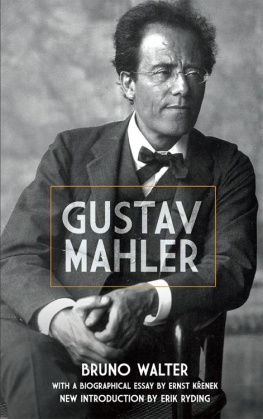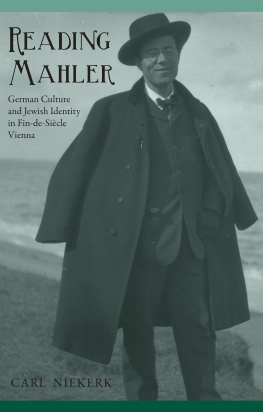GUSTAV
MAHLER
BRUNO WALTER
TRANSLATED BY
JAMES GALSTON
WITH A BIOGRAPHICAL ESSAY BY
ERNST KENEK
NEW INTRODUCTION BY
ERIK RYDING
DOVER PUBLICATIONS, INC.
MINEOLA, NEW YORK
Copyright
Introduction copyright 2013 by Erik Ryding
All rights reserved.
Bibliographical Note
This Dover edition, first published in 2013, is an unabridged republication of the work originally published by Greystone Press, Inc., New York, in 1941. Erik Ryding has prepared a new Introduction specially for this Dover edition.
International Standard Book Number
eISBN-13: 978-0-486-78236-2
Manufactured in the United States by Courier Corporation
49217601 2013
www.doverpublications.com
INTRODUCTION TO THE DOVER EDITION
THE YEAR 1894 MARKED A TURNING POINT IN THE LIFE of Bruno Schlesinger, better known as the conductor Bruno Walter (18761962). At the impressionable age of eighteen, he encountered a musician with such a powerful personalitya man of such manifest geniusthat his attitude toward life and art underwent a major transformation. The man who wrought that change was Gustav Mahler (18601911), who immediately took to the gifted teenager and became his mentor and friend.
In the 1890s, Mahler had a reputation mainly as a conductor, though some of his compositions were known to the public and had already prompted the kind of hostile criticism that would persist well into the twentieth century. Undeterred by blistering reviews of Mahlers symphonies from certain members of the press, Walter would become one of the composers most ardent champions. Even if he were not remembered today as one of the great interpreters of the orchestral repertoire, Walter would have secured a place in music history as the conductor who premiered two towering symphonic works of the early twentieth century: Mahlers Das Lied von der Erde (1911) and Ninth Symphony (1912). He also assisted in the world premiere of Mahlers Eighth Symphony, presented in Munich in 1910, and gave the Viennese premiere of that colossal piece in 1912.
Walters thorough knowledge of Mahlers music and his role as Mahlers close friend and confidant make him an important chronicler of the composers life and personality. By the first decade of the twentieth century, Walter was publishing essays about some of Mahlers works for audiences approaching them for the first time. His most significant contribution to the literature on Mahler, however, appeared in 1936, when he commemorated the twenty-fifth anniversary of the composers death with his short book Gustav Mahler, first published (without Keneks essay) by Herbert Reichner Verlag in Vienna. The content was partly a collection of scattered reminiscences, partly a discussion of Mahlers methods as a conductor and stage director, partly an overview of Mahlers uvre, and partly a sketch of the man himself. The book was not intended as a biography, though many of the anecdotes that Walter presents in the opening section are arranged chronologically and have a biographical quality. But, as Walter was aware, it was his firsthand accounts of Mahler as a man and musician that would give the book enduring value. Succinct comments recalled by WalterMahlers observation, for example, that Interesting is easy, beautiful difficult (142) or that The wild oats man has to sow are as a rule the best part of him (149)often speak volumes about the man who uttered them.
Perhaps predictably, in discussing his larger-than-life subject, Walter often sounds like a protg still under the spell of his mentor. Yet Walters relationship with Mahler was not without friction. When Mahler left Vienna in 1907, Walter mentioned to his parents that he had suffered under Mahler, who had a terrible side. That side crops up in these reminiscences several times. The great man, we read, could be hard and cutting (145), brutally insensitive to the feelings of others. One day, a composer visited Mahler to play his opera for him. According to Walter, who witnessed the scene, Mahler was
obviously sunk in the depths of boredom and aversion. When the playing had ended, Mahler did not utter a word. The composer, too, probably deeply hurt by Mahlers silence, said nothing.... There was no help for it: the composer put on his coat, wrapped up his score and, after a silence that lasted for several minutes, a coldly polite Auf Wiedersehenl! terminated the painful scene. An entire lifetime of personal relations of all kinds had not supplied Mahler with that modicum of social polish which would have brought the meeting to an ordinary end. (51)
The insensitivity that Mahler showed on this occasion evidently left a lasting impression on Walter, and no wonder: it paralleled Mahlers sometimes callous indifference toward Walters own compositions.
Walters commentaries on the symphonies, providing basic information as well as personal insights, are naturally colored by his own aesthetics. Consider the short work he makes of the Sixth Symphony, now a cornerstone of the orchestral repertoire. It is staggeringly powerful, yet for Walter, who never conducted it, the Sixthespecially in its last movementconveyed the dismal message that death [is] desirable, and life detested (120), a curiously limited reading of the work. While it almost explains his avoidance of the Sixth, it also raises questions. Was he deaf to its raging energy, its tender plaints, its passages of rapturous beautypassages that seem custom-made for Walters expressive conducting? Surely the man who so feverishly tore through the Rondo-Burleske of Mahlers Ninth Symphony in 1938 with the Vienna Philharmonic would have no trouble making a persuasive case for the Sixth, even in its thorniest and most angular passages. The questions linger.
James Galstons English translation of Walters book came out in England in 1937, a year after the publication of the Viennese edition. The American edition, published in 1941, used Galstons translation but included after it a biographical essay by the composer Ernst Kenek (19001991). His essay, while respectful, offers a less reverent view of Mahler than Walters. This should come as no real surprise, since Keneks artistic goals were markedly different from those of the two older musicians. Eclectic and open to modernist experimentation, he incorporated jazz (which Walter hated) into his hugely successful opera Jonny spielt auf (1927) and wrote a number of works using the twelve-tone method, an approach to composition that Walter publicly condemned as unnatural on several occasions. (Ironically, what appears to be the only twelve-tone piece that Walter ever conducted was written by Kenekhis Second Piano Concerto.)
Throughout his career, Kenek demonstrated a literary flair in essays and books. For his facts about Mahlers life, he acknowledged a debt to other authors. But Kenek himself had strong qualifications for writing about Mahler: his familiarity with the Austro- German musical scene in the early twentieth century, his role in preparing the score of two movements of Mahlers Tenth Symphony for their premiere in 1924, his brief marriage to Mahlers daughter Anna, and his acquaintance with Mahlers widow, Alma. His contribution to the American edition of Walters book, about half as long as Walters original, fills in some significant biographical gapsWalter, for instance, never mentions that Mahler was born Jewish, whereas Kenek brings up the matter in his first paragraphand offers an alternative assessment of the musical titan.
Unprepared for the scope or tenor of Keneks essay, Walter took its inclusion as a personal insult. He objected that this was not a short preface but rather a substantial essay that followed his own. One can imagine Walters shock at seeing his book, previously issued as an independent publication, now coupled with an extended profile of his friend, containing passages that he found irritating and misleading. Yet taken together, the two contributions offer a stimulating early portrait of a composer who, over the succeeding decades, would appeal to both Romantic and modernist sensibilities and whose music, as Mahler himself predicted, would become a staple of the standard repertoire.
Next page










